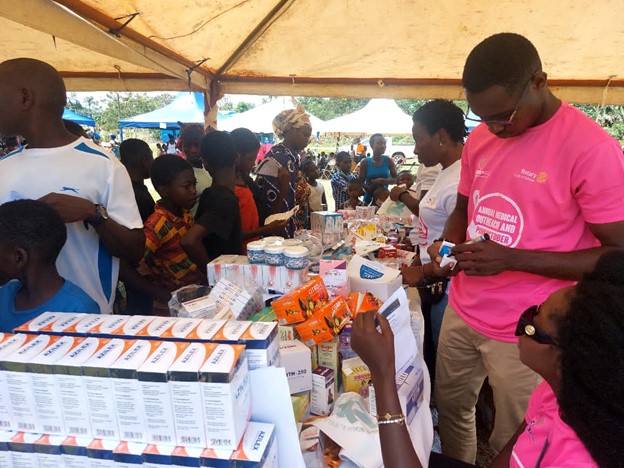Over 1700 people within five communities in the operational area of Gold Fields Ghana Limited have benefitted from a free medical outreach programme.
The beneficiary communities are Samahu, Abekoase, Tebe, Pepesa and Bompieso – all in the Prestea Huni-Valley Municipality of the Western Region.
Activities undertaken included health education, breast and prostate screening, eye test, test for blood sugar, blood pressure, malaria and administering of medication.
The medical outreach, sponsored by Gold Fields Ghana Foundation, was in partnership with five Rotary Clubs in the country; namely Tamale, Kumasi East, Kumasi, Tarkwa and Tarkoradi Anaji.
Abdel Razak Yakubu, Executive Secretary of Gold Fields Ghana Foundation, explained: “The health screening is part of the foundation’s interventions in promoting good health and well-being of the people”.
“This is our fifth partnership with the Rotary Club. We have 70 health officials from Tarkwa Municipal Hospital, Apinto Government Hospital, Euracare Diagnostic Centre, Huniso and Abosso CHPS compound and other health facilities join officials of the Foundation and Community Relations Department for the outreach. Also, we have doctors and a nurses who are past beneficiaries of the Gold Fields Ghana Foundation scholarship who volunteered to assist in this year’s outreach,” he said.
According to Mr. Yakubu, the foundation has invested US$2.9M in support of health and well-being activities since its inception.
This year, he said GH¢590,000 have been invested in this year’s annual medical outreach in the host communities of the Tarkwa and Damang Mines.
“We believe in building a healthy community. These are the same communities that feed the mine, that’s why we have brought the health screening to their doorstep,” he added.
Isabella Miakrah Nyamiah, Committee Member of the Rotary Club of Takoradi Anaji, said Rotarians across the world ensure that the health of the people in their catchment area is of paramount.
“As Rotarians, we try to support people through community service project. We bring the little resources we have to support individuals from far and near and we encourage others to also support our initiative in reaching out to a lot of people,” she said.
She added: “In October, we project healthcare services, especially on breast cancer. Currently, we see a surge in the prevalent cases of breast cancer in teenagers; and so we are educating them on the impact of breast cancer and the need for screening”.
Dr. Charles K. Yinah of the Cape Coast Teaching Hospital–Emergency Unit and a beneficiary of the Gold Fields Ghana Foundation Scholarship, praised the company for their continued support.
“The foundation scholarship took me through SHS and the Medical School and now, I am a doctor. Parents should encourage their children to go to school and pursue whatever course they wish to offer since we have a company that supports us at all time,” he said.
He mentioned:“I have been part of the medical team for this outreach programme since 2018 and will encourage beneficiaries of the scholarship scheme to come back to the communities and lend their support”.
On the screening, he said people between the ages of 40 and 70 had very high blood pressure. “Some even do not know they have hypertension. We started with the medication we came with, and they have been referred to go to the hospital for treatment”.
Also, he said someone had a very severe hypertension and was sent to the clinic within the community for intravenous (IV) therapy and later referred to the hospital for further treatment.
“This medical outreach is not only helping to get some of the chronic conditions that people have, but to help some of the emergencies that people have and do not know, so they can be sent to the health facilities for treatment” he added.
Chief of Tebe, Nana Kwame Perprah, commended the Gold Fields Foundation and the Rotary Clubs for the medical screening over the years.
“Most people either do get time to check on their health or do not have money to pay for the services. So, we take advantage of this to know our health status,” he said.
At the end of the medical screening, 16 out of 263 case recorded for breast screening were positive and were therefore referred to get a mammogram.
Also, 45 cases we recorded for prostrate cancer, and 18 out of this figure tested positive and were referred to go for further check-up at any health facility close by.
Again, 37 positive cases were recorded for malaria, out of the 223 people tested. They were treated and provided with insecticide treated nets as well as advised to keep their environment clean at all time.










